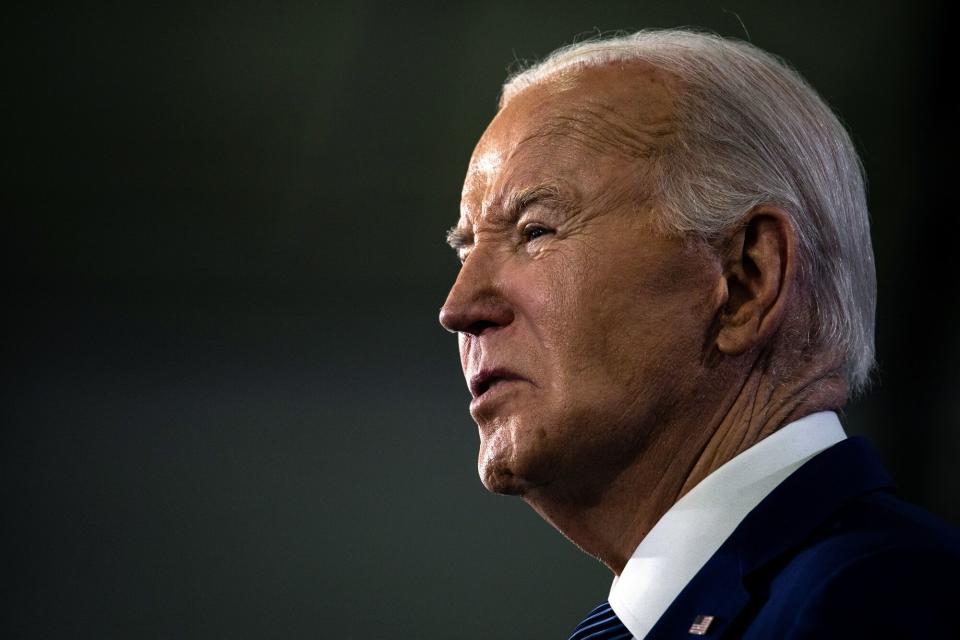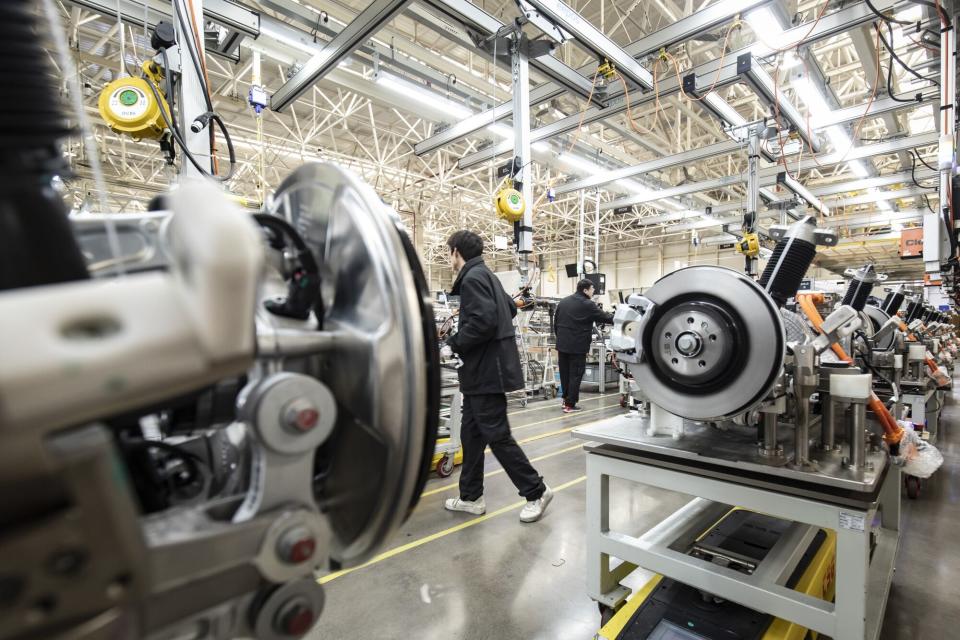Biden to Hike Tariffs on China EVs and Offer Solar Exclusions
(Bloomberg) -- President Joe Biden will quadruple tariffs on Chinese electric vehicles and sharply increase levies for other key industries this week, unveiling the measures at a White House event framed as a defense of American workers, people familiar with the matter said.
Most Read from Bloomberg
Trump Vows ‘Day One’ Executive Order Targeting Offshore Wind
Macron Puts French Banks in Play With Plan to Transform Europe
Tesla Rehires Some Supercharger Workers Weeks After Musk’s Cuts
China to Start $138 Billion Bond Sale on Friday to Boost Economy
Biden will hike or add tariffs in the targeted sectors after nearly two years of review. The total tariff on Chinese EVs will rise to 102.5% from 27.5%, the people said, speaking on condition of anonymity ahead of the announcement. Others will double or triple in targeted industries, though the scope remains unclear.
Biden and his staff spent recent weeks finalizing the measures, including which items to hit and which to avoid because the inputs are needed to fuel American growth, one of the people said. The final decision was a consensus, the person said.
It’s not clear which items were spared but Biden won’t announce tariff rate reductions, two of the people said. The administration has signaled to the US solar industry that it’ll move to exclude some items, including machinery used to make solar panel components. The shift has been sought by some equipment makers who say current levies undermine Biden’s goal of wrestling clean-energy supply chains from China.
The 2024 presidential race looms large over the flagship announcement: Biden is trying to crack down on China and differentiate himself from Donald Trump — whose original tariffs Biden is set to largely renew, but who is seeking widespread hikes that the current administration views as going too far.
Biden’s plan for more tariffs is mostly symbolic as China doesn’t rely on US consumers for the targeted sectors. Chinese EVs were virtually locked out of the US market years ago by existing tariffs, while solar firms mostly export to the US from overseas, avoiding similar curbs. China’s foreign affairs and commerce ministries didn’t immediately respond to requests for comment.
Chinese solar equipment makers slid on Monday morning despite the reported tariff exclusions. Shares of Suzhou Maxwell Technologies Co. Ltd., Shenzhen S.C New Energy Technology Corp. and Zhejiang Jingsheng Mechanical & Electrical Co. all lost more than 3% before paring some losses. EV makers such as NIO Inc., Li Auto Inc. and BYD also fell.
The Biden administration has been “focused on sectors of longstanding concern,” said Greta Peisch, a partner at law firm Wiley Rein LLP who served until January as the top trade lawyer for the US Trade Representative’s office.
“These are calculated to address particular activities and risks and avoid escalation, to maintain the relationship with China that we have” outside those key goods, she said.
The White House declined to comment on the tariffs. The auto-tariff quadrupling was first reported by the Wall Street Journal.
Biden will target key sectors including electric vehicles, batteries, solar cells, steel and aluminum, people have said. He has previously announced the steel and aluminum tariffs, which will increase to 25% on some products that have a 7.5% rate or no tariffs now. The EV rate aims to protect the US from a potential flood of Chinese autos that could upend the politically sensitive auto sector.
Trump’s 200%
The announcement is the culmination of a review of tariffs first imposed by Trump, who mocked the announcement during a campaign rally in New Jersey on Saturday.
“He says he’s going to put a 100% tariff on all Chinese electric vehicles. Isn’t that nice?” Trump said. “Biden should have done this four years ago.”
He warned that Chinese companies will try to build cars in Mexico, then avoid tariffs by shipping them to the US under the US-Mexico-Canada Agreement, which Trump agreed to as president. Trump said he’d put a 200% tariff on Chinese-made cars in Mexico.
“I will put a 200% tax on every car that comes in from those plants, and they’re not going to do that,” he said. Trump has also pledged a 60% across-the-board tariff on all Chinese goods — a move Biden is stopping well short of, with allies saying it would fuel inflation.
Biden’s measures are less about crushing segments of the market than heading off an anticipated increase in imports: Chinese steel, aluminum and autos make up tiny fractions of the US supply for now. The administration has warned that China is pushing to corner the market on key sectors and flood the US with subsidized goods, to destabilize its rival and power its own recovery.
Still, the jockeying signals a bipartisan consensus – led by the two presumptive candidates for the presidency – on the threat that Chinese electric vehicles pose to the US.
It didn’t damp enthusiasm for the US debut of Zeekr Intelligent Technology Holding Ltd., the high-end electric car maker within Zhejiang Geely Holding Group Co., which rose 35% Friday after an expanded initial public offering that was the biggest US listing by a China-based company since 2021. One of its executives downplayed the planned tariffs.
“We’re not considering short-term headwinds. We think long-term and try to make sure in the long run we make a very, very good business case,” Chief Financial Officer Jing Yuan told Bloomberg Television on Friday. “It’s more about long-term view rather than short-term headwinds.”
The administration’s approach is consistent with its goal to target China while maintaining a relationship, Peisch said.
“It’s about being strategic, not an across-the-board escalation, but what makes sense as a response to China and support for impacted US sectors,” she said.
--With assistance from Annmarie Hordern, Kailey Leinz, Justin Sink, Jennifer Jacobs, Joe Mathieu and James Mayger.
(Updates with more context and market reaction in 6th and 7th paragraphs.)
Most Read from Bloomberg Businessweek
Cheap Prison Labor Is Keeping People Locked Up Longer, Suit Alleges
‘The Caitlin Clark Effect Is Real,’ and It’s Already Changing the WNBA
©2024 Bloomberg L.P.




